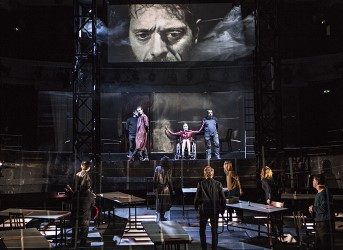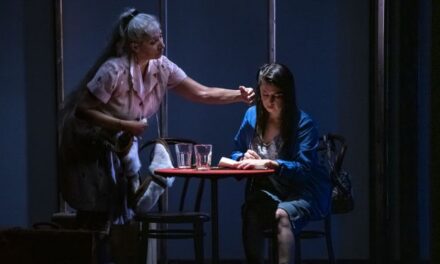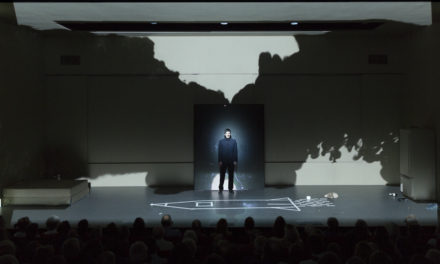“[It] is utterly useless to accuse my characters of being symbolical,” wrote Albert Camus of State of Siege, his much-maligned play about the totalitarian takeover of a seaside city. Critics continue to impugn the work—inspired by medieval morality plays—as a “hollow allegory” (The New York Times). Concerning the charges, Camus stated proudly: “I plead guilty.”
Director Emmanuel Demarcy-Mota and his team at Théâtre de la Ville wisely whittle down Camus’s fourth play—known for its lengthy, static speeches—to 95 minutes, creating a taut and dynamic production sans longueurs. Substantially cut, the play’s scenes unfold like vignettes of terror and passion, and the characters seem less like puppets ventriloquizing ideas and more like human beings—though symbolism reigns nonetheless, true to Camus’s intentions.
Scaling the heights of “spectacle” that Camus hoped for of Barrault’s bloated 1948 premiere production, this showing elides references to the specificity of its Spanish setting and presents a minimalist, dystopian black set (Yves Collet)—something out of a science fiction thriller—enhanced by projection screens and immersive sound design (David Lesser).
In their own way, the characters invited us to see our world in theirs—and I’m referring not only to the Trumpian dress and manner of the Governor (Pascale Vuillemot). Just before the house lights had dimmed, several actors entered the Cutler Majestic Theatre’s orchestra section and mingled with audience members (“Bonsoir,” “What is your name,” a dance). When sirens marked the start of the action, the play’s first actual lines—before being spoken—appeared as text messages projected on stage. This opening seemed to suggest: tonight, this is happening to us—and tomorrow, it could happen to you.
When a comet appears, the people are instructed to refer to it as nothing more than “an astral phenomenon”—or be punished. (In the logic of an allegory, not ascribing meaning to an astral phenomenon would be unthinkable.) This attempt to control thought resonates with our “alternative facts” epistemological crisis and policy decisions such as the banning of the term “climate change” at the EPA. (An EPA employee recently told me that his colleagues’ workaround is “long-term temperature increase.”) What is more, when a plague begins to attack the populace—thankfully, the government says, only the poor—the Governor’s frustration hinges on the crisis’s disruption of his hunting excursion.
But the Governor is no match for the pair emerging from beneath the billowing black tarp blanketing the stage: the Plague (Serge Maggiani) and his elegant and sinister death-delivering Secretary, a juicy role played with relish by Valérie Dashwood. As a show of force, she “requisitions” a citizen by loudly tearing a page out of the book of names—her signature weapon.
The Governor cowardly cedes his government to this new power in exchange for the protection of his family. Any remaining civil liberties are replaced by a new “order” led by the Plague, who installs a puppet ruler. Citizens must vote for the new government, and only these votes are deemed “free.” Resistance is futile—or Sisyphean, as it were.
Only bare-chested Diego (Matthieu Dessertine) successfully defies the Plague by showing no fear. When the Judge (Alain Libolt) states that he serves the law because it is the law, Diego challenges, “What if the law is a crime?” Diego’s palpably passionate trysts with Victoria (Hannah Levin Seiderman), the Judge’s daughter, create a dreamlike erotic atmosphere that is a strength of this production. Along with brief musical interludes, the couple’s romantic-poetic love-speak conjures a former time, before the darkness descended upon sea-swept, sun-kissed Cadiz. The Secretary breaks the spell, informing them that love is against the rules, and both lovers end up bearing the mark of the plague.
Defying the Secretary as nothing but a “shadow,” Diego’s lack of fear indemnifies him. Ultimately, he triumphs on behalf of his people, these “children of the sea,” for whom the “limitless sea” symbolizes their “only refuge.” His death redeems the city, whose walls come down—exposing the longed-for sea—and the Plague leaves, vowing to return.
In this production, the final speech’s sea-infused lines about the body of Nada (in the original text, an accomplice of the Plague who drowns himself) and the indomitable spirit of rebellion here instead refer elegiacally to Diego’s corpse. Adhering to Camus’s relentless symbolism, the production ends with the sound and sight of the sea—“whose bosom is the homeland of rebels”—projected on screens and streamed through speakers: “O Sea, I give you people who will never cede.”
This post was written by the author in their personal capacity.The opinions expressed in this article are the author’s own and do not reflect the view of The Theatre Times, their staff or collaborators.
This post was written by Khaleem Ali.
The views expressed here belong to the author and do not necessarily reflect our views and opinions.


















